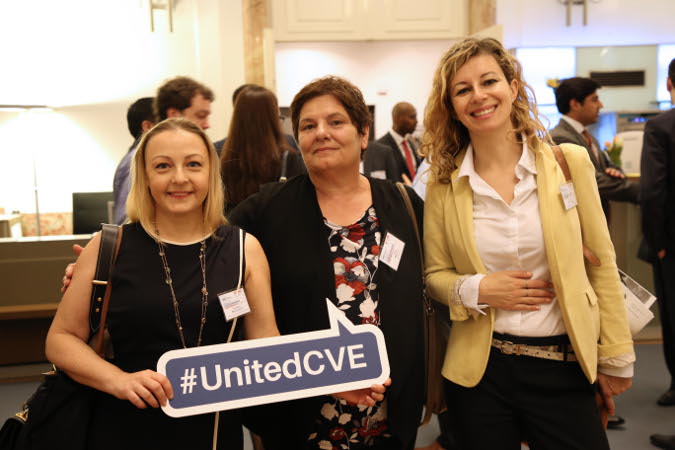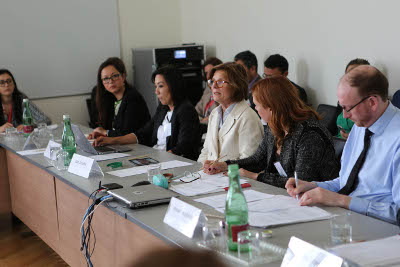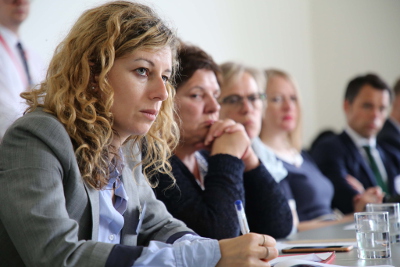Women need to be engaged in prevention of and response to violent extremism, say experts
Date:

At the OSCE-wide Counter-Terrorism Conference in Vienna, government representatives, civil society groups and high-level UN officials highlighted the crucial role women can play in preventing violent extremism and urged governments to effectively engage women in prevention and response efforts.
Over fifty experts discussed how to engage women more effectively in preventing violent extremism across Europe and Central Asia, at a packed side event on 24 May organized by UN Women and UNDP.
Taking place less than two days after the Manchester attack at a concert by a popular young female singer, which had led to many women and girl victims, the side event underlined the gendered dimensions of violent extremism.

Alastair King-Smith, Head of International Counter Extremism for the United Kingdom’s Foreign and Commonwealth Office, and co-chair of the Global Counter Terrorism Forum's working group on Countering Violent Extremism, argued that the recognition of women as full participants and as agents and voices for change is essential to develop successful policies and programmes. He noted how mothers and girls had been victims in the Manchester bomb attack but also at the frontline of responding to it. He encouraged participants to identify innovative partnerships to reinforce the role of women in prevention. He highlighted recent UK initiatives such as Families against Stress and Trauma and pointed out that more women are joining the UK police, noting “we all need to get our diversity balance right to effectively prevent and counter violent extremism (P/CVE).”
The important role that women in the security sector can play was echoed by representatives from the OSCE’s Transnational Threats Department Action against Terrorism Department and UNDP Regional Hub for Europe and the CIS and by Sweden’s Counter Terrorism Coordinator Maria Frederika Ornbrant.
Participants highlighted that women in security forces, who have already been trained to work with cases of gender-based violence, are a resource that already understands gender and violence and are well-placed to also work on prevention of violent extremism in families and local communities.
Building community level trust is key in the Western Balkans and Central Asia where radicalization is happening at various levels of society and in different contexts. Erkina Urazbaeva, PVE/Conflict Prevention Team Leader in UNDP Kyrgyzstan described how in Kyrgyzstan the number of women joining violent extremist groups is increasing. According to Urazbaeva, while few women originally traveled to Syria and Iraq, by the time the flow was at its highest, one out of every fourth person was a woman. Women whose husbands and sons have left also face tremendous stigma when they stay behind.

Mothers are therefore victims not only because they lose their children to violent groups, but also because society often views them with much suspicion and critically for not having reacted more quickly to radicalization. Edit Schlaffer, the Director of Austria-based Women without Borders, depicted how her organization has helped to empower women to engage in prevention by setting up Mothers’ Schools where mothers who are concerned about their children possibly joining violent extremist groups and mothers whose children have already done so can meet.
“We help build up mothers’ self confidence and parenting skills,” said Dr. Schaffer. “It is when a mother has a strong identity that she is best placed to talk to her children about radicalization and violent extremism.”
"Women's role is very important for preventing violent extremism. In the future, we will work on the realization of our ideas: Educate women in the security, social work, health and education sectors, about the recognition and the dangers of violent extremism and radicalization. Also, we will plan engaging non-governmental organizations, who are working with women and young people, in our activities that aim to prevent violent extremism and radicalization," said Lejla Čopelj, Secretary of the Coordination Board of the Bosnia and Herzegovina Council of Ministers for monitoring the P/CVE Strategy and Action Plan.
While experts called for programs and policies that engaged more women, they also called for an “all-in-society” approach. “We need to ensure that all parties, government, civil society, religious leaders, communities are on board from the beginning, from the time that interventions are designed until they are evaluated,” said Ms. Urazbaeva.
UN Women Senior Gender Advisor on Counter Terrorism and PVE, Naureen Fink, stressed the importance of recognizing the tremendous progress that has been made over the past years on developing frameworks that include gender. “We now need to urgently implement. Globally 15 to 20 percent of foreign terrorist fighters are women; while women are also playing key prevention roles. This underscores the need to engage women across the full spectrum from prevention to response,” said Ms. Fink.